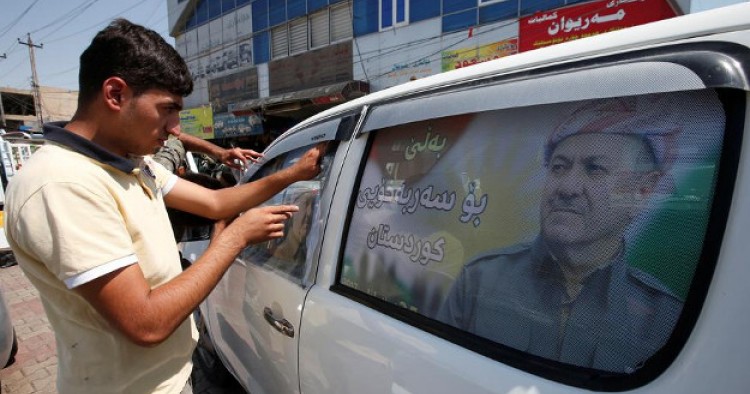As the Iraqi Kurdistan is set to hold an independence referendum on September 25, Iranian leaders and media outlets continue to warn against the consequences of such a move. “Holding referendum in Kurdistan will shape a new crisis in Iraq,” Amir Abdollahian, the Iranian Parliament’s director general for international affairs and advisor to Parliamentary Speaker Ali Larijani, said in a meeting with Eric Chevallier, an advisor to French president Emmanuel Macron.
Similarly, an article in conservative newspaper Resalat, warned that the decision by Masoud Barzani, the president of the Kurdistan Regional Government (K.R.G.), is a recipe for disaster.
It accused Barzani of violating the Iraqi constitution and playing “a dangerous game” with U.S. and Israeli support. Resalat cautioned Barzani that even if he manages to gain K.R.G.’s independence, he would not be able to manage the regional fallout of such a move. “Kurdistan must be ready for an all-out confrontation of four regional countries: Turkey, Iraq, Syria and Iran – a confrontation which Kurdistan certainly cannot manage or subdue.” It added that the Iraqi Kurdistan’s independence is not an internal issue but rather a regional and international one. The article also raised the alarm that demarcation of borders would trigger a long-term dispute between Baghdad and Irbil – particularly in the energy-rich province of Kirkuk. According to the article, independence would also leave the K.R.G. more vulnerable to the Islamic State threat and deny Irbil access to the sea.
Although Washington opposes the K.R.G.’s independence referendum plan, the Iranian newspaper claimed the referendum is part of broader U.S. strategy to divide the Islamic world. It further cautioned that the move could thrust Iraq back to chaos and instability, which would provide a ground for U.S. troops to stay in Iraq for the long haul.
Comment: On June 7, K.R.G. officials announced that an independence referendum would be held on September 25 – a move Tehran strongly opposes. Iranian leaders fear that the Iraqi Kurdistan’s independence may undermine Iran’s long-term strategic interests in Iraq. In April, Major General Qassem Soleimani, the head of the Islamic Revolution Guards Corps (I.R.G.C.)'s elite Quds Force, reportedly traveled to the Iraqi Kurdish city of Sulaymaniyah to convince Iraqi Kurdish leaders not to hold the referendum. The Iranian general, according to Asharq al-Awsat, held meetings with leaders of the Patriotic Union of Kurdistan (P.U.K.), which is headed by Jalal Talabani, and urged them against reaching an agreement over the referendum with President Masoud Barzani, who is also the head of the Kurdistan Democratic Party (K.D.P.). Other Iranian leaders have also publicly voiced opposition to the referendum plan.
On Monday, Secretary of Iran’s Expediency Council Mohsen Rezaei also warned that the consequences of the Iraqi Kurdistan’s referendum plan. “Disintegration of Iraq would mark the beginning of widespread insecurity not only in Iraq, but in the entire region… We oppose such a referendum and call on the Kurdish leaders to halt that plan,” he said at a press conference in Baghdad. The former chief commander of the Islamic Revolution Guards Corps (I.R.G.C.) also accused K.R.G. leaders of playing a “dangerous game” and pursuing “personal motives” rather than national interest.
Moreover, Iranian-backed Iraqi militia groups have also warned that they would not allow any parts of Nineveh Province to be incorporated into the Iraqi Kurdistan Region. A senior official of Asa’ib Ahl al-Haq, an Iran-supported militia unit within Iraq’s Popular Mobilization Forces (P.M.F.), earlier this month threatened violence against the leadership of the Iraqi Kurdistan, according to Fars News Agency. Adnan Faihan, the head of the group’s political office, warned Barzani against “marking the border with blood” and said his militia forces are ready to confront him if the Kurdish leader “tries to impose his will on disputed regions.”
Tehran is also concerned that such a move might trigger calls for autonomy among its own Kurdish population. Militant and separatist groups have waged a low-intensity insurgency against the Iranian state for decades. Iranian Kurds – estimated about eight million – have long complained about state-sanctioned discrimination and economic and political marginalization. The Kurdistan Democratic Party of Iran – a militant group based in the Iraqi Kurdistan – has resumed militancy and occasionally launches attacks against the Iranian security forces.
The Middle East Institute (MEI) is an independent, non-partisan, non-for-profit, educational organization. It does not engage in advocacy and its scholars’ opinions are their own. MEI welcomes financial donations, but retains sole editorial control over its work and its publications reflect only the authors’ views. For a listing of MEI donors, please click here.












